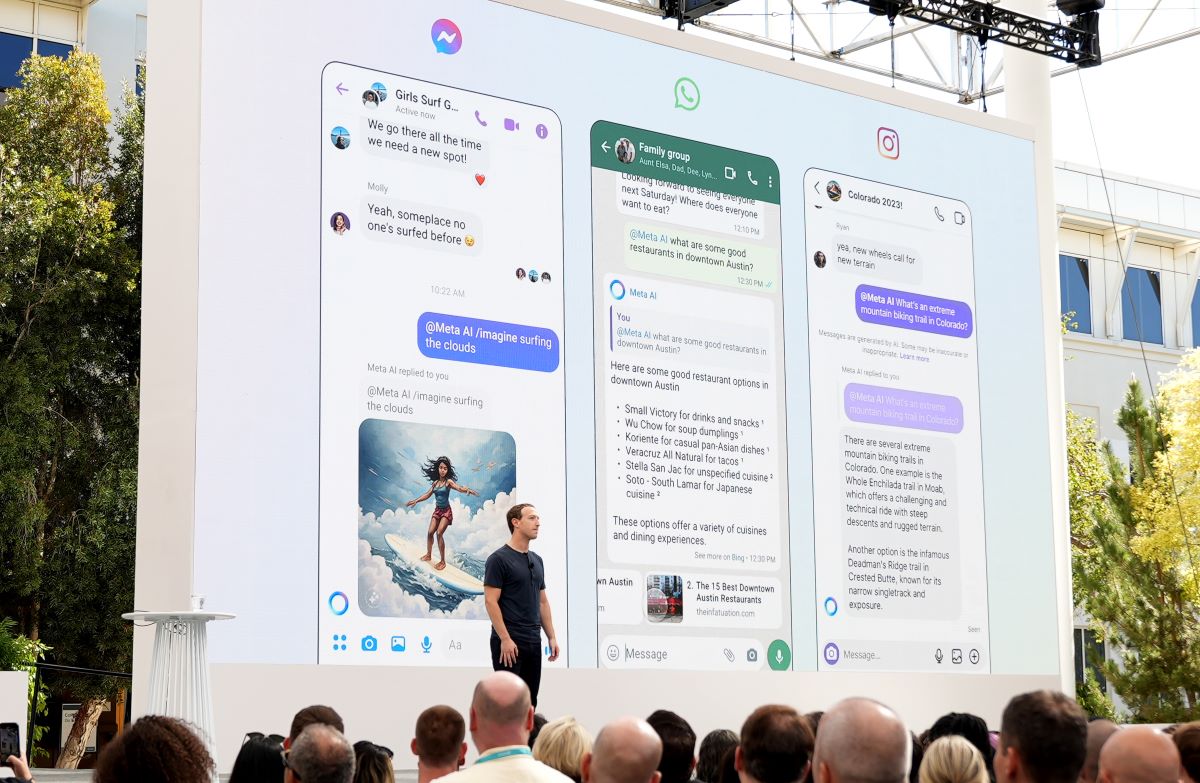On the 10th anniversary of Connect, Meta CEO & Founder Mark Zuckerberg shared on September 27, 2023, how the rise of AI and metaverse technologies are reshaping the way we experience our physical and digital worlds.
Certainly, both define our reality, today.
Zuckerberg and Meta suggest that we can replace our TV with a fully customizable home theater that we can wear and take with us anywhere.
Meta said we can sit around with friends, with some physically in the same room while others are avatars, yet all using the same space and sharing the experience.
Taking a step further, meeting avatar-embodied AIs can help users solve complex tasks or think out of the box.
This mixed reality allows us to create fully immersive experiences to explore. AR glasses bring these technologies together and Meta looks to have thought this through.

Mixed Reality with Meta Quest 3
Meta Quest 3 is the world’s first mainstream headset built for mixed reality. It has double the graphic processing power of Quest 2 and features the world’s first new Snapdragon XR2 Gen 2 platform that was developed with Qualcomm Technologies. The standalone device uses no PCs, consoles, or battery packs.
It’s smart enough to understand our physical space but allows exploration of a much larger world beyond it.
Meta announced that over 100 new and upgraded titles are coming to Quest 3 this year, many incorporating mixed reality. But it comes with access to a vast library of 500+ VR and MR experiences.
Starting at $500, Quest 3 is available for shipping from October 10.

Meta advances in AI
Meta has introduced Emu (short for Expressive Media Universe) which uses text prompts to generate high-quality, photorealistic images in just seconds. Emu combined with technology from Llama 2 can allow users to create custom AI stickers in chat.
The company also introduced restyle and backdrop, features that are coming soon to Instagram that use Emu to transform photos or co-create AI-generated images with friends.
Restyle lets you reimagine images by applying the visual styles the user describes. Backdrop can change an image’s scene or background using text prompts.
Read: Apple, Meta, throw their hats in the GenAI race

Meta AI studio
Meta is of the belief that there will not be one single super-intelligent AI that everyone uses. Rather, it believes that people will want different AIs for different things, like finding information, communicating, being entertained, playing games, helping you get work done, and more. One might want to even customize his pr her own AI to meet their personal or business needs.
For that reason, Meta is Building the AI studio, a new platform for creating AIs that can help get things done or just for fun. These Ais will have profiles on Instagram and Facebook, allowing users to chat with them in WhatsApp, Messenger, and Instagram. These can be embodied as avatars in the metaverse as well.
Meta also created its own AI assistant that uses a custom model based on Llama 2 technology and has access to real-time information through a partnership with Bing search.
AI studio will ultimately let developers build third-party AIs for Meta-messaging services. A sandbox that will let people who don’t code create their own AIs.

Ray-Ban | Meta Smart Glasses
The Meta next gen of smart glasses are designed to stay connected without needing to take out the phone.
Today, wearers will be able to livestream directly from their smart glasses to friends and followers on Facebook and Instagram.
These are also the first smart glasses to ship with Meta AI built in.
Smart glasses represent a natural way to see digital holograms in the physical world, but will also let users’ AI to see what they see and hear what they hear. It comes with an upgraded 12
Mega Pixel camera and five-mic system. 32GB of storage allows storing up to 500 photos, and 100 30-second videos. The charging case helps preserve and extend the battery life of the glasses by up to 8 additional charges for an additional 32 hours of battery life.
Starting at $300, the Ray-Ban Meta smart glasses collection will launch on October 17.
For more tech news, click here.








